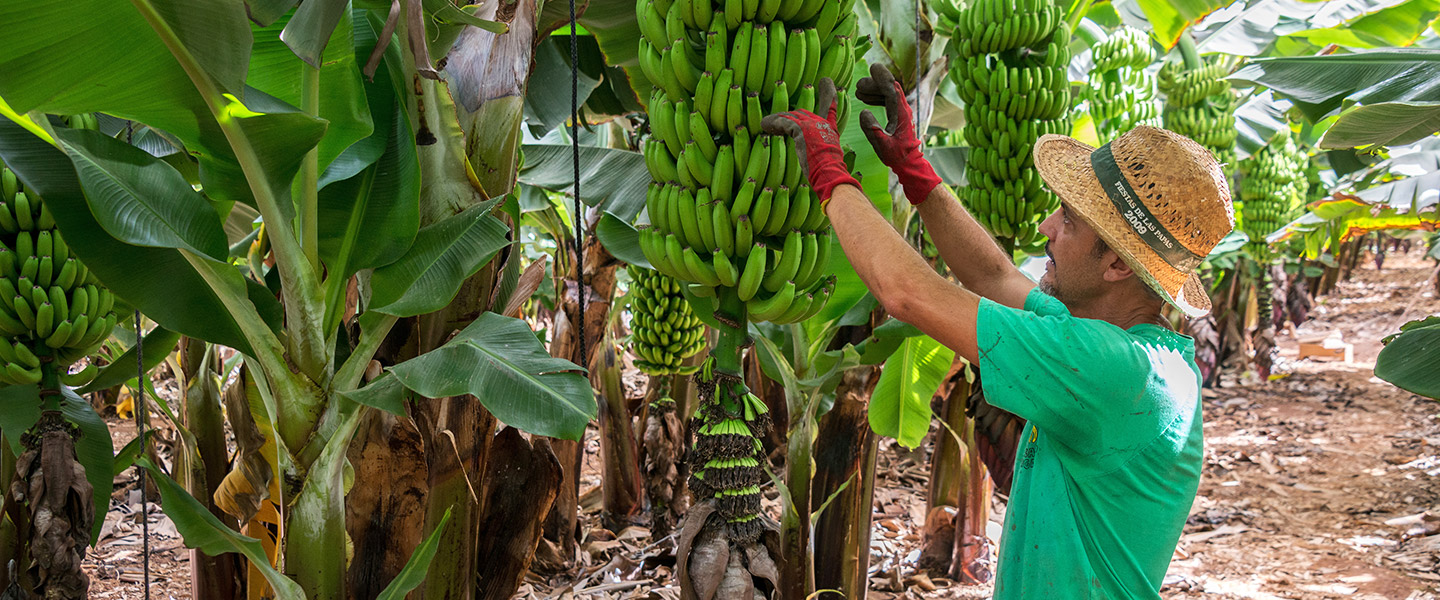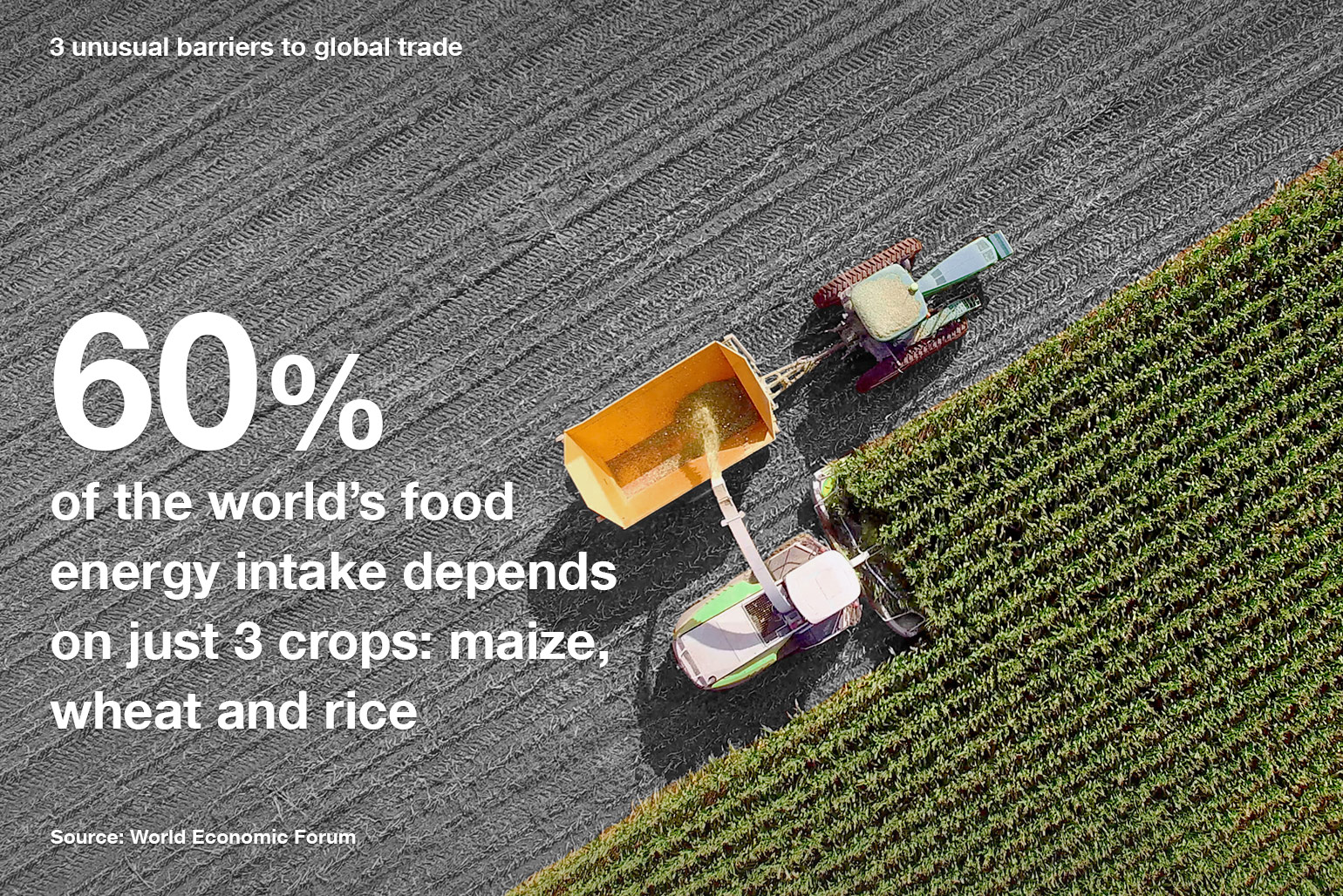3 unusual barriers to global trade


As a key driver of employment, prosperity and interconnectivity, trade is incredibly important. But it is also hugely complex, and with complexity comes risk. These are just some of the issues that can disrupt how the world buys, eats and works.
It is not just humans who are at risk in a globalised world: crops are, too. Even as we fight COVID-19, global banana producers are fighting their own pandemic: a fungus called Tropical Race 4, or Panama Disease.
The fungus has spread to 20 countries, and there is no cure. To make matters worse, the disease can incubate in an otherwise healthy-looking plant for up to a year before symptoms show, by which time the fungus will have spread. To fight back, banana farmers are rolling out measures that will by now be familiar to all of us. Farms are being locked down. Farmers are washing plants, disinfecting their boots and even “masking up” crop trees, wrapping the fruit to protect it from the fungus.
Why is the humble banana so important? It’s not just because millions of people rely on them as a food staple. It’s because when crops fail, the livelihoods of many vanish too. In Ecuador alone it is estimated that bananas are responsible for 2 million jobs.

Bananas are not the only food at risk from disease (in 2019, a quarter of the world’s pigs died from African Swine Fever, for instance) but they are an example of how the globalised world should manage food trade vulnerabilities. As the saying goes: don’t put all your eggs in one basket. Currently, 47 per cent of banana production is made up of a single variety — the hardy Cavendish, well-suited to being knocked about when shipped around the world. But if the Cavendish fails catastrophically, then so do global banana supplies. As with many other areas of trade, banana producers are realising that diversification is key to limit or decrease the risk from potential diseases. There are over 1,000 other types of banana, each with their own flavour profiles and advantages in growth rates or immunity. Most consumers, however, may be used to the Cavendish, so shoppers will have to be willing to change their tastes in the interest of food security.
Some are theorising that diversification could lead to more environmentally friendly practices too, like swapping mega-plantations for organic, mixed crop plantations that are better for the soil — and more climate-change resilient.
As COVID-19 has taught us, whole countries can be left low on supplies when traditional trade methods grind to a halt.
However, it is a situation that can also foster innovation. Jaguar Land Rover had to think outside the box when the world went into lockdown and supply chains seized up. Their solution: shipping key car components to the UK not by traditional cargo vessels as per their usual routine, but by air, packed in good old-fashioned suitcases. But workarounds like these are the exception, not the norm, and highlight how vulnerable we are to disruptions in the global supply chain. As an article in the Financial Times noted, “It takes 2,500 parts to make a car, but only one not to.”
Similarly, oversupply can cause problems too. In a time of rampant pollution, many industries persist with strategies that put profit ahead of the planet. Some high-end fashion brands, for example, burn any unpurchased products at the end of a season. On a global scale, the practice can add up to billions of dollars going up in smoke. Why does this happen? Simple supply and demand: to ensure those products do not flood the market and dilute the sense of exclusivity many brands seek to cultivate.
Luckily, corporate priorities are changing, with some new companies forging their entire identity around sustainability. Canadian fashion brand Tentree, for example, plants 10 trees for every piece of clothing or accessory purchased, aiming to plant a staggering one billion trees by 2030. Speaking to Vogue Business, co-founder Derrick Emsley says: “We’re a tree-planting company that sells apparel, not an apparel company that plants trees.” But for real change to happen, this sentiment needs to become the backbone of the whole industry, and fast. According to a 2017 report, the fashion industry is projected to use more than a quarter of the world’s allotted carbon budget by 2050.

For all its modernisation, trade is a physical affair. Ships still have to sail their routes to get from A to B. But what if danger lurks in-between?
A piece co-penned by the insurance corporation AIG and the non-governmental organisation Chatham House, revealed that storms, droughts, terrorist attacks, cyberattacks, political instability and simple disrepair are some of the many challenges facing shipping companies. Piracy is still disturbingly common: in the first nine months of 2018 alone, there were 156 reported pirate attacks worldwide.
If you disrupt just one of the world’s eight key maritime chokepoints (narrow points easily handicapped by congestion), research by Chatham House indicates major problems could arise in terms of global food security. To counteract this, legions of brokers, security analysts and insurers continually stress-test scenarios and develop contingencies, to keep trade flows of the vital goods we buy running smoothly.
“In the first nine months of 2018 alone, there were 156 reported pirate attacks worldwide.”
These sort of protective measures are vital, because if a single area of trade is affected, then a domino effect can occur. As Divyesh Divecha, Standard Chartered’s Executive Director of Product Management, Trade says, “There is no single region that is disconnected from global trade.” Every region, he notes, is vulnerable.
Those vulnerabilities are why trade is like growing a delicate potted plant. It needs constant nurturing, because if it is not looked after, it can wither.
That is why at Standard Chartered, we do all we can to be a proactive player in making global trade more resilient. In some cases, that means transforming painfully slow manual processes and letting software do the legwork. Kahina Van Dyke, our Global Head of Digital Channels and Data Analytics, Corporate, Commercial and Institutional Banking (CCIB), gives one example. The Bank recently worked with Kenyan healthcare supply-chain platform Medsource. Like many businesses, Medsource was struggling with manual payment processes, and its turnaround times suffered as a result. By automating that system with Application Programming Interfaces, the Bank helped rid Medsource of a system dependent on the speed staff could work on each payment. The result: fast-tracking vital medical supplies when people need them most.
And in some cases, upheaval is forging future strength. As a consequence of COVID-19, the rate of digitisation in the trade space is speeding up, making processes more resilient. Technology,” says Kahina, “is a great enabler. It’s often the best path to solving core business problems in good times and bad.”
While there may be much to keep trade experts up at night, there’s always a solution waiting to be found.
Ninety per cent of what you buy comes to you by sea. We explore why cargo ships are a vital…
From the phone in your pocket to the food you eat, trade is more than a contributor to our comfortable…
Read more
Our planet is warming at a dangerous rate. What impact is this having on trade, and the communities who rely…